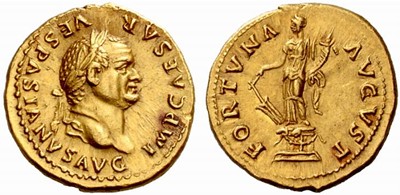
To see the previous installments, click on the following links: #1, #2 , #3, #4, #5, #6, #7, #8, #9, #10, #11, #12, #13, #14, #15
When the two duoviri showed up at my employer's house, the very air seemed charged with an urgency that had not been felt before. The midday sun filtered through the tall cypress trees in the garden, casting long, sharp shadows on the marble pavement as they crossed the threshold with determined steps. I watched from a corner, knowing that their visit did not bode well. Although they were not easy men to impress, there was a mixture of anxiety and determination on their faces.
"Vespasian has spoken," were the first words out of the younger man's mouth, though his companion, the more experienced duoviri, took the reins of the conversation. His tone was low, but firm, as if he bore the weight of an imperial command. "The death of Lucius Flavius Crispus cannot remain unresolved. Rome demands answers and she wants them now."
My patron, a shrewd man ever mindful of his position, received them in his atrium, where the frescoed walls depicted bucolic scenes that contrasted with the tension that filled the air. He bowed slightly in respect, but the stiffness of his body revealed that he did not at all like the tone of his interlocutors.
"I understand the gravity of the matter," said my employer in his characteristic soft voice, which contrasted with the seriousness of the moment. "But you must also understand that justice cannot be hastened without risking its incompleteness."
The older duoviri frowned, evidently impatient. "Emperor Vespasian has been informed. Domitian himself has intervened to have this matter resolved as soon as possible. Gaius Flavius Sabinus, Lucius' father, is an influential man and his influence has reached as far as Rome. This is not just a murder, it is an insult to the Flavian family. Time is a luxury we do not have."
My eyes fell on my patron, whose expression remained unperturbed, but I knew the duoviri's words were weighing on him. It was clear that this investigation was no longer merely a local matter; it was now a state problem. My employer could not ignore the pressure coming directly from the corridors of power in Rome. He called out to me then with a slight gesture, and I approached, knowing that my intervention was imminent.
"Hispanus," he said, fixing me with his sharp gaze, "you must intensify your efforts. The duoviri demand results and we cannot keep the emperor waiting."
I nodded, aware of the danger hanging over my head if I failed to make progress in solving the case. The duoviri watched me with that mixture of distrust and expectation, as if my mere presence was an unknown to them. They knew I was a freedman, that I was not like the other men under their command, and that difference made them uncomfortable. But their pressure was clear: I had to continue my investigations, and fast.
"Your help will not be forgotten by Rome," added the younger duoviri, in an attempt to ease the tension. But we all knew that those words, though kind in form, contained a veiled threat.
I withdrew from the courtroom, leaving my employer to discuss the details with the magistrates, but the sense of urgency that emanated from their conversation stayed with me as I reordered my thoughts. I knew I had to find the culprit, not only to avoid the wrath of the Flavii, but also to avoid bringing the emperor's wrath down on us all.
To be continued
Header Image:
Coin of Vespasian Source: Wikipedia
Nothing to correct! Excellent work 👍🏻🤩
I really hope Hispanus will find the murder.
Gratias plurimas ( Latin language), Uly and Yumi
That's super cool! I don't know any Latin word, but you are welcome in English.